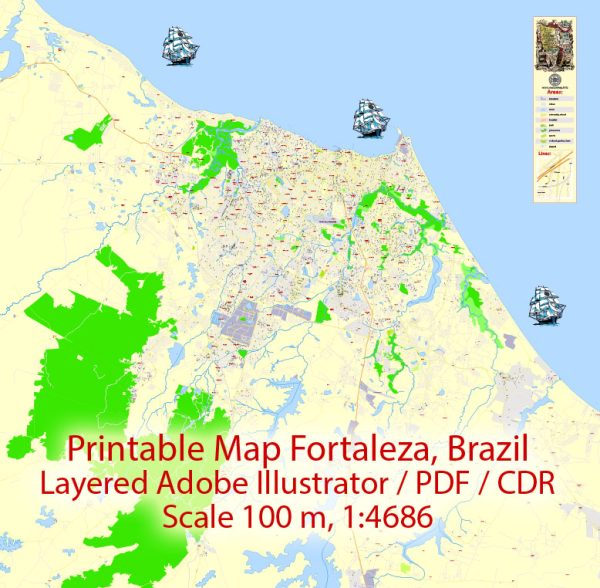Fortaleza, located in northeastern Brazil, is the capital of the state of Ceará. It is a city with a rich history and a vibrant culture. Here is a brief description of the history of Fortaleza:
- Colonial Era: Fortaleza’s history dates back to the 17th century when it was founded as a small village in the Portuguese colony of Brazil. The city’s name itself, which means “fortress” in Portuguese, reflects its origins as a protective fortification against foreign invasions. The Fort of São Tiago, now known as the Fortress of Nossa Senhora da Assunção, played a significant role in the city’s early history.
- Economic Activities: During the colonial period, Fortaleza’s economy was largely based on agriculture and fishing, but it began to expand due to its favorable location along the coast. The city also became a hub for the slave trade, with African slaves being brought to the region to work on sugar plantations.
- Independence and Growth: Fortaleza played a role in Brazil’s struggle for independence from Portugal in the early 19th century. In 1824, Brazilian forces fought a significant battle against Portuguese troops near the city, known as the Battle of Jenipapo. The city continued to grow as it became an important center for trade and commerce.
- Urban Development: In the late 19th and early 20th centuries, Fortaleza experienced significant urban development, with the construction of public buildings, ports, and railways. The city’s architecture from this era still influences its character today.
- Modernization and Tourism: Fortaleza’s economy has diversified over the years, with tourism becoming a major industry. The city’s beautiful beaches, such as Praia de Iracema and Praia do Futuro, are popular attractions for both domestic and international visitors. The city has also developed a reputation for its lively culture, including music, dance, and cuisine.
- Cultural Heritage: Fortaleza is known for its cultural richness, particularly in the realms of music and dance. Forró, a traditional Brazilian dance and musical style, has deep roots in the region. The city also hosts numerous cultural festivals, including Carnival, which is celebrated with parades, music, and vibrant costumes.
- Modern Challenges: Like many cities, Fortaleza faces modern challenges, including urbanization, traffic congestion, and environmental concerns. Efforts have been made to address these issues while preserving the city’s historical and cultural heritage.
Fortaleza’s history is a tapestry of colonial heritage, independence struggles, economic development, and a vibrant cultural scene. Today, it stands as a dynamic city on the northeastern coast of Brazil, welcoming visitors with its warm climate, beautiful beaches, and a rich cultural tapestry that reflects its historical roots.


 Author: Kirill Shrayber, Ph.D. FRGS
Author: Kirill Shrayber, Ph.D. FRGS